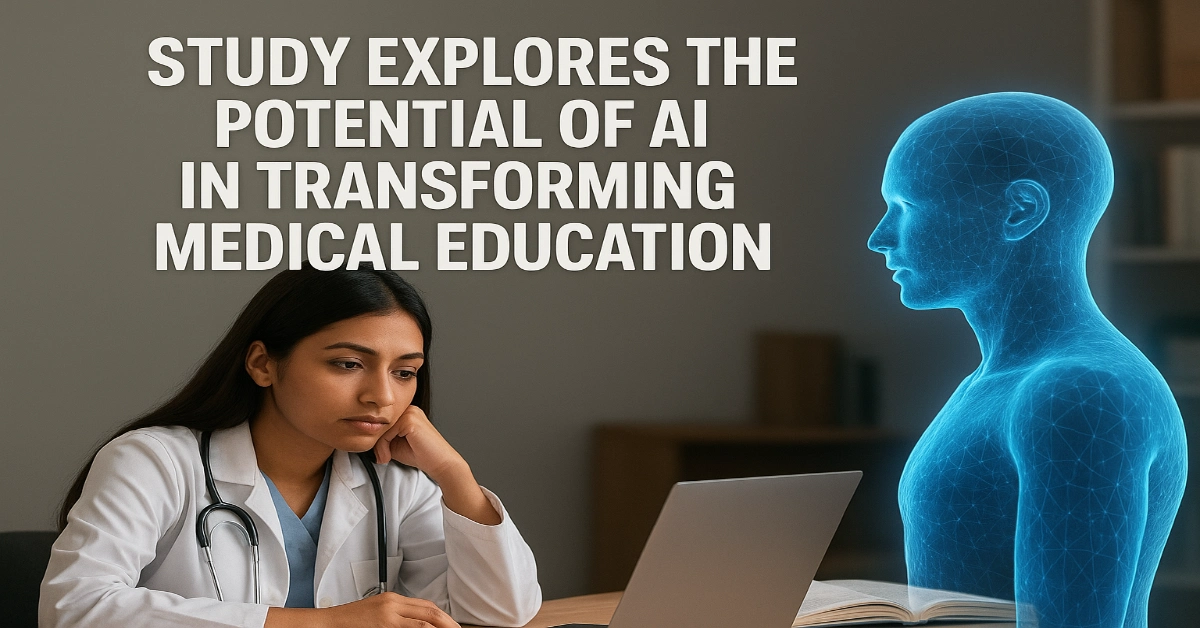AI in Transforming Medical Education: Artificial Intelligence (AI) is rapidly reshaping global healthcare, and now, it is transforming how future doctors learn, practice and think. Imagine a medical student diagnosing a virtual patient, or a junior doctor practising complex procedures like drawing blood inside a metaverse classroom.
These aren’t scenes from sci-fi movies. They’re emerging realities backed by cutting-edge research.
A new study published in The Lancet Digital Health shows how AI can revolutionise medical education worldwide, while also calling for robust collaboration between medical schools, hospitals, and regulators to make adoption safe, ethical and scalable.
Why AI in Medical Education Matters Now More Than Ever
Health systems around the world are struggling with severe workforce shortages. According to the World Health Organisation (WHO), there will be a shortage of 10 million healthcare workers by 2030.
This gap demands faster, more effective ways to train doctors, nurses, and allied health professionals.
The researchers highlight that AI can help bridge this divide by:
- Speeding up training
- Improving clinical exposure
- Supporting personalised learning
- Enhancing accessibility for students worldwide
Key Highlights of the Study: What AI Can Change in Medical Education
AI-Generated Virtual Patients for Realistic Practice
AI can now create highly realistic virtual patients, offering:
- Unlimited clinical scenarios
- Consistent case difficulty
- Instant feedback
- No logistical or financial constraints
Such simulations help students practice diagnoses, physical exams (via AR/VR), and treatment planning, anytime, anywhere.
Metaverse Classrooms for Procedural Skills
Integration with augmented reality (AR), virtual reality (VR), and metaverse platforms means learners can:
- Practice blood draws
- Perform basic surgical tasks
- Engage in team-based emergency simulations
- Conduct case discussions in immersive 3D environments
These innovations reduce dependence on physical labs and improve training efficiency.
Personalised Learning With AI Co-Tutors
Generative AI tools like ChatGPT and other large language models (LLMs) act as “digital co-tutors.”
They can:
- Provide customised feedback
- Break down complex concepts
- Analyse student weaknesses
- Assist in exam preparation
- Streamline literature reviews and research tasks
This frees educators to focus on mentorship, ethics, and critical thinking.
Smarter Research Workflows
AI tools now automate:
- Literature searches
- Summaries of clinical papers
- Data extraction
- Draft preparation
Young researchers can devote more time to innovation rather than repetitive analysis.
What Experts Say: AI Will Empower, Not Replace Educators
Dr Jasmine Ong, Duke-NUS AI + Medical Sciences Initiative, explains:
“AI is not here to replace clinical educators and mentors, but to empower them. Serving as a digital co-tutor, AI enhances learning through personalised feedback and realistic simulations.”
Her view signals a shift: AI will augment, not override, the human element in medical training.
Challenges: Accuracy, Bias, Ethics & Implementation Gaps
Despite its benefits, the study warns of major challenges:
LLM Accuracy & Hallucinations
Large language models sometimes generate:
- Incorrect clinical facts
- Fabricated data (“hallucinations”)
- Misleading diagnoses
These issues highlight the need for strong verification systems.
Algorithmic Bias
LLMs have shown biases linked to:
- Gender
- Race
- Socioeconomic background
If trained on biased medical literature, AI risks amplifying systemic inequities.
Privacy & Data Security
Using patient data to train AI models raises concerns:
- Confidentiality breaches
- Lack of clarity on data use
- Regulatory lapses
Lack of Qualified AI Trainers
There is a global shortage of educators who can teach medical AI responsibly.
Dr Ning Yilin, Senior Research Fellow at Duke-NUS’ Centre for Quantitative Medicine and joint first author of the paper, said:
“As AI becomes more deeply integrated in medical education, we must address ethical concerns, maintain learning integrity, and prevent unintended harms.”
Read Also: NMC Chairman Proposes AI Integration and 1:1 MBBS-PG Seat Ratio for Medical Education 2025
Collaboration Is Key to Safe and Scalable AI Adoption
The study emphasises that no single institution can drive AI-enabled medical education alone.
Success requires a tightly coordinated network of:
- Medical schools
- Hospitals and healthcare institutions
- Industry partners
- Government bodies
- Accreditation agencies
- Ed-tech innovators
Associate Professor Liu Nan summarises:
“By partnering across sectors, we can deploy generative AI responsibly and translate gains into better patient care.”
What such collaborations must deliver:
- Ethical frameworks for AI use
- Standardised training modules
- Funding and infrastructure support
- Transparent testing and auditing of AI tools
- Scalable models for global adoption
Read Also: AI & Modern Technology in Indian Medical Education: Trends, Challenges & Future Roadmap
AI Is Redefining the Future of Medical Training
From virtual patients to metaverse classrooms, AI is ushering in a new era of medical education, more interactive, personalised, and scalable than ever before.
However, responsible adoption is crucial. With ethical frameworks, unbiased models, and cross-sector partnerships, AI can help train millions of healthcare workers and close the global care gap.
As the Lancet study shows, AI is not replacing doctors; it’s helping create better ones.

